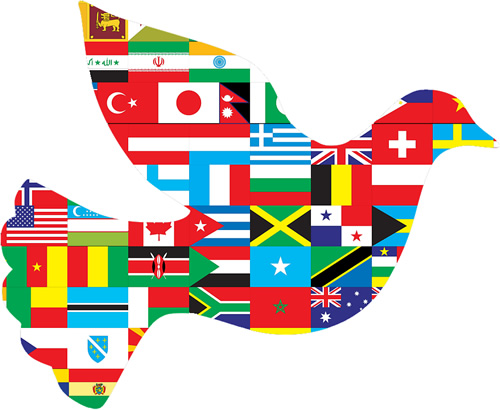Traveling Abroad Responsibly
Give the Poorest in the World a Break
By Rick Steves
 |
| More than ever, the world tourism industry must function as a tool for peace. |
As we recognize the problems confronting the earth and humankind, more and more people are recognizing the need for the world's industries, such as tourism, to function as tools for peace. Tourism is a $8 trillion industry that employs more than 300 million people. As travelers gain a global perspective, the demand for socially, environmentally, and economically responsible ways to travel will grow. Peace is more than the absence of war, and if we are to enjoy the good things of life — such as travel — in the next century, the serious issues that confront humankind must be addressed now: through responsible travel and political action.
Transitions Abroad offers many exciting opportunities for both. Here are a few of my favorite organizations.
Global Volunteers, a nonprofit organization, offers useful "travel with a purpose" trips throughout the world. The work varies by country, but if Europe's your goal, you'll likely teach conversational English in Cuba, Costa Rica, Ecuador, Greece, Italy, Mexico, Peru, Poland, Portugal, Spain, Romania, or Tanzania.
Volunteers for Peace, another nonprofit, runs international workcamps to promote goodwill through friendship and community service. Options include historical preservation and conservation projects.
If you'd like to restore medieval ruins, work in wildlife reserves, or care for refugee children in camps, see the resources and program listings on TransitionsAbroad.com.
Consume Responsibly
Whether you're working or playing, consume responsibly in your travels. Understand your power to shape the marketplace by what you decide to buy — in the grocery store, in the movie theater, or in your choice of hotels.
In my travels (and in my writing), I patronize and support small, family-run, locally-owned businesses: hotels, restaurants, shops, tour guides. I choose people who invest their creativity and resources in giving travelers simple, friendly, sustainable, and honest experiences — people with ideals. Back Door places don't rely on slick advertising and marketing gimmicks, and they don't target the created needs of people whose values are shaped by capitalism gone wild. Traveling responsibly means consuming responsibly. Your trip is a vote for the kind of world we could have.
Travel Thoughtfully
Travel like Gandhi — with simple clothes, open eyes, and an uncluttered mind. Celebrate the similarities and differences in cultures. Seek international styles of living out of a genuine interest in the people and cultures you visit. Be positive and optimistic, and don't dwell on problems or compare things to back home. Accept and try to understand differences: Paying for your Italian coffee at one counter and picking it up at another may seem inefficient until you realize it's more sanitary — the person handling the food never handles money. Be observant and sensitive: If 60 people are eating quietly with hushed conversation in a Belgian restaurant, you know it's not the place to yuck it up.
Speak the Language
Make an effort to bridge that flimsy language barrier. Rudimentary communication in any language is fun and simple, even with a few basic words. On the train to Budapest you might think that a debate with a Hungarian over the merits of a common European currency would be frustrating with a 20-word vocabulary, but you'll surprise yourself at how well you connect just by trying. Don't worry about making mistakes — communicate!
Reach out to meet the people you traveled so far to see. Lunch with a group of Palestinian college students, walk through Moscow with a diehard Communist, and learn why the Swiss aren't completely comfortable with a unified Europe. Go as an ambassador, a guest, a friend. In travel, too, you reap what you sow.
Jubilee
If you want to tackle more than travel, consider political action. Jubilee is a worldwide movement of concerned people and groups — religious and secular — working to cancel the international debts of the poorest countries. It's inspired by the Biblical "Year of Jubilee" during which social wrongs are righted and debts are canceled.
Debt keeps the poorest countries poor. Money needed for health care and education is diverted to interest payments. Mozambique, with a per capita income of $540, a life expectancy of 58, and almost no health care, spends much of its government's income on interest payments. A baby in Nicaragua is born with a debt to the rich world of over $800 with an income earned by the family head of $1,900. These debts translate into real suffering among local people born long after some dictator borrowed (and squandered) that money. As interest is paid, people go hungry.
The debts are owed mostly to the U.S., Germany, the U.K., Japan, France, and other European countries, either directly or through the World Bank and the International Monetary Fund. Rich governments can forgive the debt owed directly to them by the poorest nations and pay the market value of the debts owed to the World Bank and International Monetary Fund. We have the resources. All America needs is the political will and people power.
For the sake of peace, fragile young democracies, and countless real people, forgiving this debt is the responsible thing for us in the rich world to do. To learn about lobbying Congress on this issue, contact Bread for the World. Let's celebrate this millennium by giving the poor world a break.
Rick Steves writes European travel guidebooks and hosts travel shows on public television and radio. His 50-plus books on European travel are available at bookstores and at www.ricksteves.com.
|